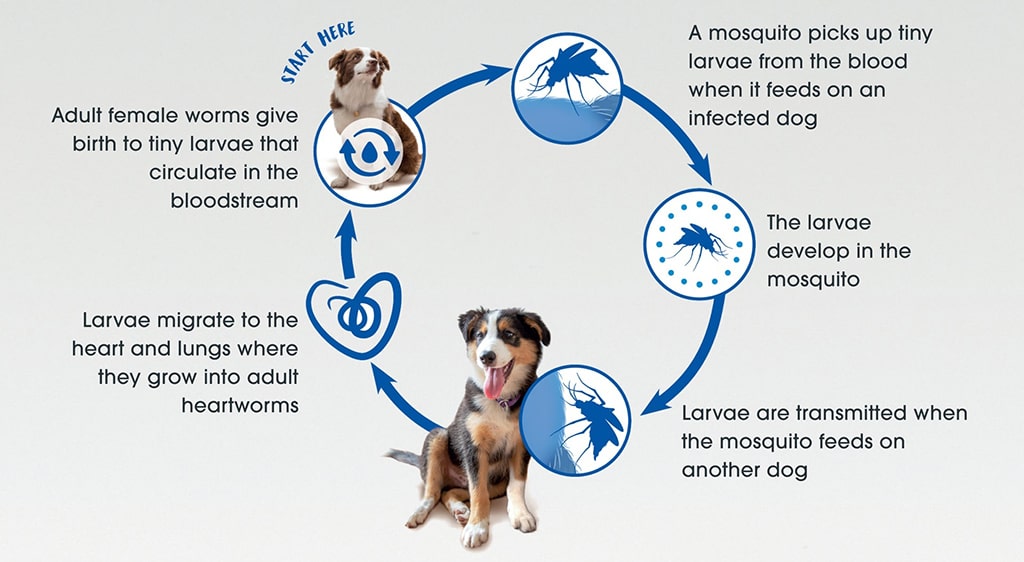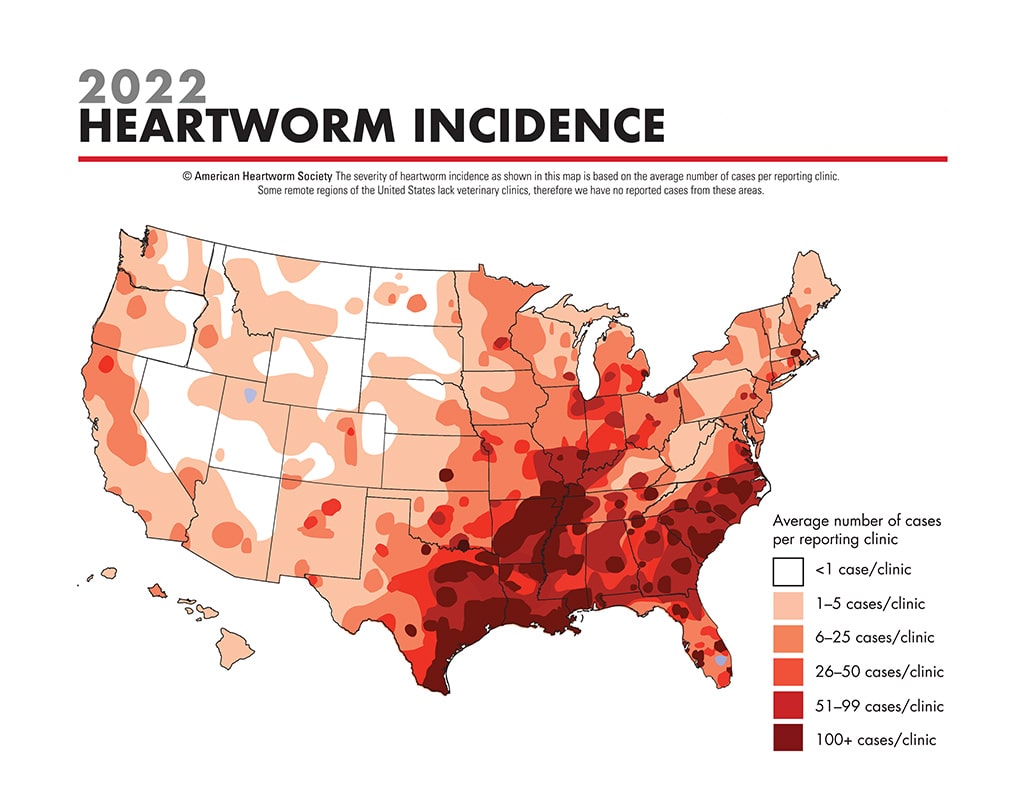Heartgard is one of the best medications for preventing heartworm disease in dogs and cats. It contains ivermectin, which eliminates heartworm larvae before they mature. Regular use of Heartgard not only ensures your pet’s health but also reduces treatment costs, and with pet insurance, you’ll have even greater peace of mind.
Pets and Heartworm Disease
Heartworm, a dangerous parasite, causes severe health problems and can sometimes be fatal. It primarily targets dogs and cats, though it rarely infects mice. Although human infections are extremely uncommon, they occur occasionally, usually without noticeable symptoms. The good news is that proper veterinary care can effectively prevent and treat heartworm.
What is Heartgard?
Heartgard is a chewable tablet that protects pets against heartworm disease and is also effective against some types of intestinal parasites, including hookworms and roundworms. The medication helps kill immature heartworms before they mature and damage the animal’s cardiovascular system.
Heartgard vs. Other Heartworm Preventatives: Which One Is Best?
When it comes to heartworm prevention, Heartgard is one of the most popular choices—but is it really the best? Well, it depends on your dog’s needs and your preferences. Heartgard is a chewable tablet that prevents heartworms and also helps control roundworms and hookworms. Some other brands, like Interceptor Plus and Sentinel, offer additional parasite protection, including whipworms and tapeworms. Meanwhile, topical options like Revolution work for both heartworms and fleas.
So, is Heartgard the best? If you want a reliable, vet-recommended chewable that protects against heartworms and common intestinal parasites, it’s a solid choice. But if your dog needs broader parasite control, you might want to explore other options. Always talk to your vet before making a decision.
Is Heartgard Safe for Your Dog? What Every Pet Owner Should Know
For most dogs, Heartgard is extremely safe. It has been around for decades and is one of the most recommended heartworm preventatives by vets. However, if your dog has certain health conditions or belongs to a breed that’s sensitive to ivermectin (like Collies or Australian Shepherds), you’ll need to be extra cautious. In such cases, your vet might suggest a different medication.
Also, if your dog already has heartworms, giving Heartgard can cause complications. That’s why vets recommend a heartworm test before starting the medication.
Is Heartgard effective in preventing heartworm?
Yes! Heartgard chewables are highly effective when given every month without fail. They work by killing off any heartworm larvae that may have entered your dog’s system from a mosquito bite. However, they don’t kill adult heartworms, so if your dog already has an infection, this won’t be a cure.
The key to making Heartgard work? Consistency. If you miss a dose or give it late, your dog could still be at risk for heartworms. Set a reminder on your phone so you never forget!
How do heartworms enter animals?
Heartworms only enter animals through mosquitoes. When a mosquito bites an infected animal, tiny young worms called microfilariae enter the mosquito’s system. Within about two weeks, these young worms develop into infectious larvae in the mosquito. When the mosquito bites another animal, the larvae enter that animal’s body.
How It Protects Your Dog from Deadly Parasites?
Heartgard contains ivermectin, a powerful ingredient that kills heartworm larvae before they grow into adult worms. Once adult worms develop, they invade the heart and lungs, causing serious damage that can lead to heart failure and even death. That’s why prevention is so important—because treating heartworms once they’ve matured is expensive, risky, and tough on your dog.
By giving Heartgard every month, you’re stopping those tiny larvae in their tracks before they can do any harm. It’s a simple step that can literally save your dog’s life.
Can pet insurance cover heartworm disease?
Yes, in many cases you can use pet insurance to cover the costs of heartworm disease, but the terms and conditions depend on the type of insurance and plan you choose. Before purchasing insurance, carefully review the terms and coverage and make sure that parasitic diseases such as heartworm are covered by your chosen plan.
Do I Need a Prescription to Use Heartgard?
Yes, Heartgard requires a prescription from a veterinarian. Your veterinarian will typically perform a heartworm test before prescribing it to ensure your pet is not already infected.
A blood test is an essential tool that veterinarians use to diagnose adult heartworm infection in dogs, especially those infected for more than six months. The most common test is the antigen test, which is highly accurate and detects the presence of adult female heartworms in the bloodstream. Additionally, antibody testing can show whether your pet has been exposed to heartworm. Giving Heartgard to a pet with adult heartworms can lead to serious complications.
How Often Should Heartgard Be Used?
Heartgard should be given to your pet on a monthly and ongoing basis to break the life cycle of the larvae that can harm your pet. Missing a dose can increase the risk of heartworm infection.
Heartgard: Benefits and Dosage
Benefits:
- Prevents heartworm disease (which is fatal if left untreated)
- Protects against roundworms and hookworms
- Comes in a tasty beef-flavored chew (most dogs love it)
- Easy to give—once a month
- Vet-approved and widely trusted
Dosage: Heartgard comes in different strengths based on your dog’s weight. The usual dosing schedule is one chewable per month. Be sure to give it consistently, because missing doses could put your dog at risk for heartworms.
Heartgard for Puppies: When and How to Start
Puppies can start Heartgard as early as 6 weeks old. The key is to make sure they get their dose every month. Skipping doses increases the risk of heartworm infection, which is super dangerous for puppies since their immune systems are still developing.
Starting your puppy on Heartgard early means they’ll be protected from the start—no worries about those nasty parasites sneaking in. Just make sure you give the right dosage based on their weight, and never split chews between dogs, as the dosing is specific.
Possible Symptoms After Heartgard in Cats and Dogs
While most pets tolerate Heartgard well, some side effects may occur.
Possible side effects in dogs include:
- Vomiting
- Diarrhea
- Lethargy
- Salivation
- Sometimes incoordination
In rare cases, dogs may experience seizures, especially if they are genetically sensitive to ivermectin (such as some herding breeds).
Side effects in cats are rare but may include:
- Vomiting
- Lethargy
- Loss of appetite
It is important to contact your veterinarian if any unusual behavior occurs after administering the full prescribed dose of Heartgard.
Does Your Pet Need to Take the Full Prescribed Dose of Heartgard?
Your pet should take the full prescribed dose of Heartgard every month. This ensures the medication is effective in killing any heartworm larvae. Skipping or reducing the dose can leave your pet vulnerable to infection.
Where to Buy Heartgard: Online vs. Vet Prescriptions
Heartgard requires a prescription, which means you can’t just grab it off the shelf at a pet store. You have two main options for buying it:
1. From your vet – Usually the most reliable option, plus your vet can ensure you’re getting the right dosage.
2. Online pet pharmacies – Websites like Chewy, 1-800-PetMeds, and Petco offer Heartgard, often at discounted prices. However, you’ll still need a prescription from your vet to order it.
Be cautious when buying from third-party sellers (like random Amazon listings) because fake pet medications exist. Always buy from reputable sources to make sure your dog is getting the real deal.
Final Thoughts: Should You Choose Heartgard?
If you want a trusted, effective, and easy-to-administer heartworm preventative, Heartgard is a fantastic choice. It’s been around for years, is backed by vets, and most dogs love the taste. As long as you give it on time every month, it does an amazing job at protecting your pup from deadly heartworms.
Still unsure? Talk to your vet about whether Heartgard is the best choice for your furry friend. But one thing’s for sure—heartworm prevention isn’t optional, and Heartgard is one of the best ways to keep your dog safe!
For optimal protection against heartworms and other parasites, remember to follow the prescribed schedule carefully. If you have any concerns or notice an unusual reaction after giving Heartgard, consult your veterinarian for advice.
You can visit Chewy Pharmacy to purchase this product.
U.S. Advancement assumes no responsibility for Chewy Pharmacy.
















